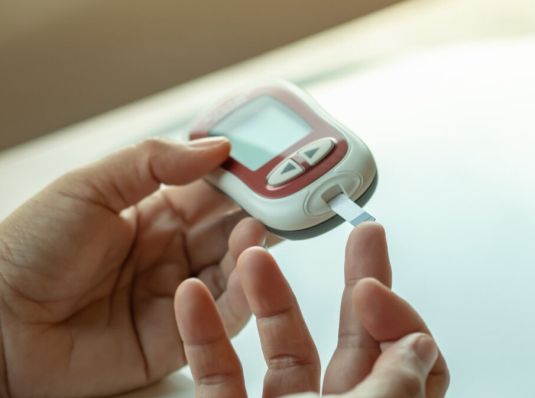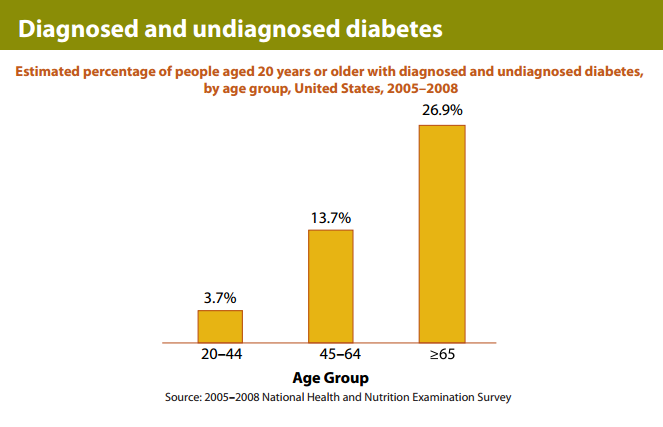Diabetes

What is Diabetes?
Any of a group of several diseases that affects a person's ability to produce insulin, impairs insulin action, or both. It can result in very serious complications and even death, but can be managed by working with healthcare providers and an adequate support network.
Facts About Diabetes
- 25.8 million people in the U.S. have diabetes
- That translates to approximately 8.3% of the total population!
- Diabetes is a leading cause of:
- Kidney failure
- Non-traumatic lower-limb amputations
- New cases of blindness
- Diabetes is a major contributor to heart disease and stroke
- 7th leading cause of death in the U.S.

Symptoms
- Frequent urination
- Sudden vision changes
- Excessive thirst
- Tingling / Numbness in extremities
- Unexplained weight loss
- General unexplained fatigue
- Extreme hunger
- Very dry skin
- Slow-healing sores
- Weakened immune system
Types of Diabetes
Type 1 (formerly Juvenile - Onset)
- Makes up 5% of diagnosed cases
- Immune system destroys pancreatic beta cells
- Can be an automatic response by immune system to a virus, passed down from parents, or environmental
Type 2 (formerly Non-Insulin Dependent)
- Makes up 90-95% of all diagnosed cases
- Is a result of insulin resistance due to the impaired pancreas efficiency
Gestational (Only Pregnant Women)
- 2-10% of all pregnancies present symptoms
- 5-10% chance to have Type 2 immediately after
- 35-60% chance of developing in the next 10 years
- 5-10% of cases present in a major birth defect
- 15-20% result in spontaneous abortion or extremely large babies
Risk Factors
Type 1 Diabetes
- Autoimmune response impairment
- Infections
- Family history
- Specific genetic syndromes
- Environmental triggers
- Surgery
- Drugs
- Malnutrition
Type 2 Diabetes
- Age
- Obesity
- Family history
- Gestational diabetes
- Impaired glucose tolerance
- Physical inactivity
- Race / Ethnicity
Gestational Diabetes
- Ethnicity
- African American
- Hispanic / Latino American
- American Indians
- Obesity
- Family History
Complications
Heart Disease and Stroke
- 68% of diabetes deaths had evidence of heart disease
- 16% had evidence of stroke
- Stroke risk is 2-4 times higher in diabetes patients
Hypertension
- 67% of people with diabetes have hypertension
Blindness
- 28.5% of diabetic patients have diabetic retinopathy
Kidney Disease
- Diabetes contributed to 44% of kidney disease deaths
Nervous System Disease
- 60-70% of diabetic patients have mild to severe nervous system damage
- Symptoms Include: impaired sensation in feet / hands, slowed digestion, carpal tunnel syndrome, erectile dysfunction
Amputations
- Diabetes was a factor in 60% of non-trauma limb amputations
Dental Disease
- Young adults with diabetes had 2 times higher risk for dental diseases
- Poorly controlled diabetics had a 2.9 times higher risk
- Poorly controlled diabetics who smoked presented with 4.6 times higher risk
- 33% had loss of attachment of teeth
Treatment
There's currently no known cure for Diabetes, but there are ways to manage yourself and help prevent complications.
- Healthy eating
- Physical activity
- Regulate blood sugar levels
- Oral medications can help
- Type 1 patients
- Insulin injections
- Type 2 patients
- Blood glucose monitoring
Source: Center for Disease Control
CIS does not provide medical advice, diagnosis or treatment. The content provided is for informational purposes only.
Back To Health Education